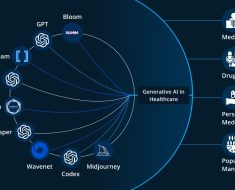Artificial intelligence has become a driving force in modern businesses, enabling efficiency, innovation, and strategic advantage. In the realm of e-commerce, the impact of AI continues to grow, transforming various aspects of online retail operations. By delving into the cutting-edge AI projects that are revolutionising e-commerce, businesses can harness these innovative technologies to stay ahead of the curve and thrive in the competitive digital landscape.
AutoGPT: E-commerce Automation and Development
One of the key AI projects revolutionising e-commerce is AutoGPT, an artificial intelligence system with the capability to write its own code and execute Python scripts. Its advanced features open up a world of possibilities for automating and developing e-commerce platforms.
A. The capabilities of AutoGPT in writing code and executing Python scripts AutoGPT is designed to understand and generate code based on natural language input. This enables it to write code snippets or even complete programs in response to specific tasks. Its ability to execute Python scripts further enhances its potential to automate e-commerce operations and streamline various processes.
B. Potential applications in e-commerce automation and development AutoGPT’s capabilities can be harnessed in numerous ways to revolutionise e-commerce. For instance, it can help create customised product recommendations based on customer behaviour, automate inventory management, and even optimise pricing strategies. Additionally, it can be used to improve website design, enhance user experience, and facilitate more efficient customer support.
C. How to leverage AutoGPT for e-commerce operations To make the most of AutoGPT’s potential, e-commerce businesses should first identify areas where automation and development can have the most significant impact. They can then integrate AutoGPT into their existing systems and processes to optimise operations, reduce manual effort, and drive growth. As the technology continues to evolve, businesses should also stay updated on the latest advancements and explore new ways to leverage AI in e-commerce.
NVIDIA and Microsoft Partnership: Enhancing User Experiences
The collaboration between NVIDIA and Microsoft to bring AI to personal computing is a game-changer in the technology industry. This partnership aims to develop cutting-edge AI solutions that can be integrated into everyday devices, making advanced computing accessible to a broader audience. As a result, this collaboration has significant implications for e-commerce platforms, opening up new opportunities for enhanced user experiences and operations.
E-commerce platforms can benefit from the AI advancements brought about by the NVIDIA and Microsoft partnership. By leveraging AI technologies in areas such as image recognition, natural language processing, and recommendation engines, e-commerce businesses can offer more personalised and engaging shopping experiences. Improved user experiences can lead to higher customer satisfaction, ultimately resulting in increased sales and brand loyalty.
Moreover, the partnership between NVIDIA and Microsoft has the potential to revolutionise e-commerce operations. With AI-driven analytics and automation, businesses can optimise their supply chain management, inventory control, and marketing strategies. Additionally, AI can assist in identifying trends and patterns in customer behaviour, enabling e-commerce platforms to anticipate and adapt to changing consumer demands. This level of insight and adaptability is crucial for e-commerce businesses to thrive in the increasingly competitive digital marketplace.
In conclusion, the NVIDIA and Microsoft partnership represents a significant step forward in the integration of AI into personal computing. The resulting advancements in AI technology have far-reaching implications for e-commerce platforms, providing opportunities for enhanced user experiences and streamlined operations. By embracing AI-driven solutions, e-commerce businesses can stay ahead of the curve and ensure their continued success in the digital landscape.
Google Pixel’s AI-Powered Photo Editing: Revolutionising Product Imagery
As the e-commerce landscape becomes increasingly competitive, the importance of captivating product imagery cannot be overstated. In recent years, Google Pixel’s AI-powered photo editing tools have emerged as a game-changer, offering innovative features that can help e-commerce businesses create more dynamic and engaging visual content.
A. The AI features in Google Pixel’s photo editing tools
Google Pixel’s photo editing tools leverage artificial intelligence to enhance image quality, fine-tune colours, and optimise lighting conditions. These AI-powered features enable users to effortlessly create professional-grade product images, even without advanced editing skills. The technology can also intelligently identify and remove unwanted elements in photos, allowing e-commerce businesses to present their products in the best possible light.
B. Potential impact on e-commerce product imagery
The AI capabilities of Google Pixel’s photo editing tools hold immense potential for revolutionising e-commerce product imagery. By streamlining the editing process and enabling businesses to create high-quality visuals with ease, these tools can significantly improve product presentation and customer engagement. In turn, this can lead to increased conversion rates and enhanced customer satisfaction.
C. Creating more dynamic and engaging visual content
With the help of Google Pixel’s AI-powered photo editing tools, e-commerce businesses can create more dynamic and engaging visual content that stands out from the competition. By harnessing the power of artificial intelligence, these tools allow businesses to experiment with different styles, colours, and lighting effects to create captivating product images that resonate with their target audience. In the competitive world of e-commerce, embracing such cutting-edge technology can be a crucial factor in staying ahead of the curve and ensuring continued growth and success.
AutoGPT Arena Hackathon: Encouraging AI Innovation in E-commerce
The AutoGPT Arena Hackathon is an event designed to inspire and encourage the development of innovative artificial intelligence solutions within the realm of e-commerce. The goals and objectives of this hackathon revolve around fostering creativity, collaboration, and problem-solving among participants. By focusing on the creation of AI agents to improve customer service and task handling, the AutoGPT Arena Hackathon has the potential to significantly benefit e-commerce businesses.
One of the primary areas of focus in the hackathon is the development of AI agents that can effectively handle customer service tasks, such as answering questions, processing returns, and resolving issues. These AI-driven customer service solutions can streamline the support process for e-commerce companies, providing customers with accurate, timely, and helpful assistance. By automating these tasks, businesses can reduce costs, improve efficiency, and ultimately enhance the overall customer experience.
Another key objective of the AutoGPT Arena Hackathon is the development of AI agents capable of handling various e-commerce tasks, such as inventory management, order processing, and sales forecasting. By leveraging artificial intelligence in these areas, e-commerce businesses can make more informed decisions, optimize their operations, and ultimately boost their bottom line. The potential benefits for e-commerce businesses participating in this hackathon are numerous, making it an excellent opportunity for companies to explore and experiment with cutting-edge AI technologies.
ChatGPT: Interactive and Accessible Customer Support
One of the key aspects of any successful e-commerce platform is the ability to offer responsive and helpful customer support. ChatGPT, an advanced AI technology, has the potential to revolutionise this aspect of e-commerce with its new voice and image capabilities. This allows for a more interactive and accessible way of providing support to customers, ensuring their questions and concerns are addressed efficiently and effectively.
Integrating ChatGPT into e-commerce platforms can significantly enhance the overall customer experience. The AI-driven technology can be programmed to handle a wide range of customer queries, from product information and order tracking to returns and refunds. With its advanced natural language processing capabilities, ChatGPT can understand user inputs in both text and voice formats, enabling a seamless communication experience.
Moreover, the ability of ChatGPT to process and understand images adds another layer of convenience for customers. For instance, if a customer has an issue with a product they received, they can simply send a photo of the item to the chatbot, which can then analyse the image and provide an appropriate response or solution.
By harnessing the power of ChatGPT, e-commerce businesses can create a more engaging and accessible customer support system that caters to the diverse needs of their users. This can ultimately lead to improved customer satisfaction, increased brand loyalty, and enhanced overall business performance.
Auto-GPT vs ChatGPT: Choosing the Right AI for E-commerce
When it comes to leveraging artificial intelligence in the realm of e-commerce, it is crucial to choose the most suitable AI solution for your specific needs. Two popular AI models, Auto-GPT and ChatGPT, offer distinct capabilities and advantages. Understanding the differences between these models and their potential applications in e-commerce can help you make an informed decision.
A. The differences between Auto-GPT and ChatGPT
Auto-GPT and ChatGPT, both developed by OpenAI, share some similarities but have different focuses. Auto-GPT is designed to write code and execute scripts, making it an excellent choice for automation and development tasks. On the other hand, ChatGPT is more focused on generating human-like text responses, making it ideal for customer support and communication purposes.
B. The self-prompting capabilities of Auto-GPT and its potential for autonomous e-commerce systems
One of the key advantages of Auto-GPT is its self-prompting capability, which allows it to autonomously generate and execute code without human intervention. This feature can be particularly beneficial for e-commerce businesses looking to automate various tasks and processes, such as inventory management, order processing, and customer support. By integrating Auto-GPT into your e-commerce platform, you can potentially create a more efficient and autonomous system that can handle routine tasks with minimal human input.
C. Selecting the best AI solution for e-commerce needs
To choose the right AI solution for your e-commerce business, it is essential to consider your specific needs and objectives. If your primary goal is to streamline your e-commerce development and automation, Auto-GPT might be the better choice. However, if your focus is on enhancing customer support and communication, ChatGPT might be more suitable. By carefully evaluating the capabilities and strengths of each AI model, you can select the most appropriate solution to revolutionise your e-commerce operations.
OpenAI’s Arrakis Project: Lessons for E-commerce AI Development
The ambitions and setbacks of the Arrakis project offer valuable insights for e-commerce businesses looking to leverage AI technology. Initially, OpenAI aimed to create a highly efficient AI system with the Arrakis project. Despite its promising start, the project faced several challenges, ultimately leading to its discontinuation. Nonetheless, the experiences gained from this project provide important lessons for the future development of AI in e-commerce.
Ongoing efforts to create more efficient AI systems continue to drive innovation in the field. Researchers and developers are constantly pushing the boundaries of AI technology, exploring new possibilities and applications. As a result, e-commerce businesses have the opportunity to benefit from these advancements, using AI to enhance their operations, improve customer experiences, and boost their overall performance.
Key takeaways for e-commerce operations from the Arrakis project include the importance of setting realistic goals and expectations, learning from setbacks, and adapting strategies as needed. Furthermore, it highlights the need for continuous investment in AI research and development, as well as the value of collaborations and partnerships in driving innovation. By embracing these lessons, e-commerce businesses can better position themselves to leverage AI technology and remain at the forefront of their industry.
Ultimate ChatGPT Prompt Collection: Streamlining Communication and Marketing
Artificial intelligence has made significant strides in enhancing various aspects of e-commerce, including communication and marketing. One notable innovation is the use of AI-generated prompts, which play a crucial role in crafting highly effective e-commerce strategies. By generating relevant and engaging prompts, AI can help businesses tailor their messaging and target customers more accurately.
One valuable resource in this regard is the ‘Ultimate ChatGPT Prompt Collection’, which offers a wide range of AI-generated prompts suitable for various e-commerce applications. Utilising this collection can bring about numerous benefits, such as improving the overall quality of marketing communications, saving time spent on creating content, and ensuring that messaging remains consistent across different channels. The collection also allows for rapid iteration of marketing ideas, enabling e-commerce businesses to test different approaches and quickly refine their strategies.
By incorporating the ‘Ultimate ChatGPT Prompt Collection’ and other AI-driven tools into their communication and marketing efforts, e-commerce businesses can enjoy a more streamlined and efficient approach. This integration can lead to better customer engagement, higher conversion rates, and ultimately, a more successful e-commerce venture. As the field of AI continues to advance, businesses can expect even greater benefits from incorporating this cutting-edge technology into their operations.
Conclusion
In this article, we have discussed various artificial intelligence projects that are revolutionising the e-commerce industry. From AutoGPT’s capabilities in automation and development to ChatGPT’s enhanced customer support, these AI solutions offer a wide range of benefits for businesses in the online retail space.
As we look towards the future of AI in e-commerce, it is evident that its applications will continue to expand and evolve. Businesses that embrace these cutting-edge technologies will undoubtedly stand to gain a competitive edge and enjoy continued growth and success.
Encouraging businesses to adopt AI solutions is not only essential for their own progress but also for the overall advancement of the e-commerce industry. By staying informed about the latest AI projects and understanding their potential applications, companies can make informed decisions about implementing these technologies and shaping their strategies for the future.
Embrace AI-Powered E-commerce
Unlock the potential of artificial intelligence for your e-commerce business by exploring the mentioned AI projects and their applications. Delve into the innovative technologies that are revolutionising e-commerce operations:
Stay ahead of the curve and enhance your e-commerce strategies with the power of AI.




